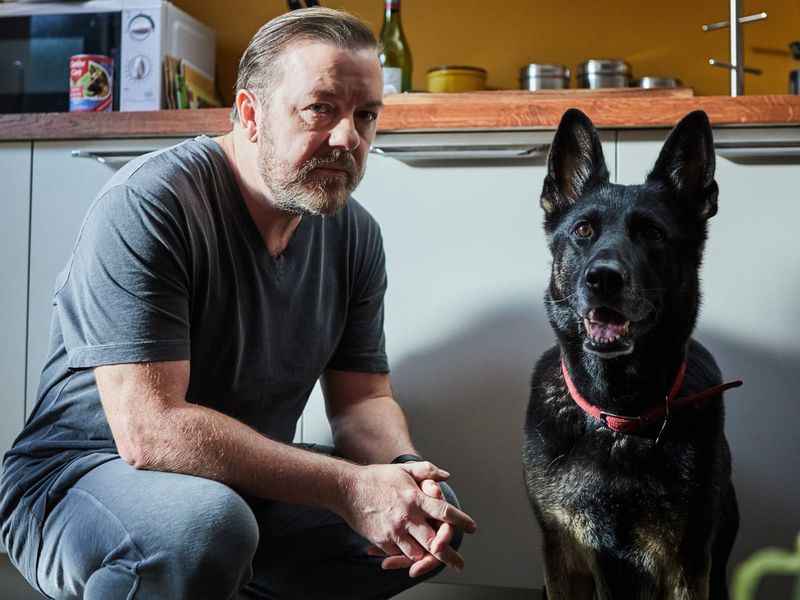In the very first season of Netflix’s After Life, a cynical and grief-stricken Tony Johnson says, “Here’s what’s what: humanity is a plague. We’re a disgusting, narcissistic, selfish parasite, and the world would be a better place without us. It should be everyone’s moral duty to kill themselves. I could do it now. Quite happily just go upstairs, jump off the roof, and make sure I landed on some c*nt from accounts.”
Tony’s nihilism binds him within a doldrum of a routine after he loses his wife, Lisa, to cancer. Tony visits his senior father in the retirement home. Tony works at a local free newspaper. Tony gets drunk on his couch and occasionally does drugs with a local druggie. Tony is, in general, an asshole to everyone around him simply because he misses Lisa, and without her, his world is dark, gloomy and purposeless. He constantly threatens to kill himself but cannot do it as he is continuously deterred by his dog.
Across the three seasons, although Lisa is not present physically, she is a looming entity in Tony’s life, and our minds via the compilation of videos Tony watches as well as the ‘how-to’ life guide she records for him from her death bed.
In the first two seasons, Tony is angry and hurting. His cynicism and delusion regarding humanity are at their peak. Even the zany jokes are his coping mechanism. He builds up walls to guard himself against further disappointment. Tony’s life comes crumbling down with Lisa’s tragic demise and his dog, Brandy — a constant reminder of the happy times he spent with Lisa — is his only solace and the one who stops Tony from taking his life.
Besides, a chance encounter with an elderly widow named Anne at the graveyard aids Tony more than his crackhead therapist. Her words of wisdom help him find answers to some of life’s most challenging problems, helping Tony slowly but steadily grapple with grief.
However, the third season sees the complete catharsis of Tony. He is still grieving and hurting, but he slowly understands how to live with it. He no longer lives for himself but others. From cashing out Lisa’s insurance cheque to giving fractions of that money to help others, the show portrays how Tony is still the man Lisa fell in love with- as she keeps saying, “Be happy. Be kind. Be Tony.”
His kindness reaches its peak in the final episode when he visits a children’s cancer hospital. From meeting another Lisa to whom he, for the first time, does not open up about his loss, to admitting to a child about his belief in Heaven, Tony is truly no longer the selfish, self-centred drunkard the first few episodes portrayed him as.
Throughout the third season, taking place in the aftermath of the pandemic, where the world is no longer in need of masks, reeling under constant fear, Tony pays heed to his father’s last request. The journalist is seen being the pseudo son for an older man whose own son has forgotten him, lets go of Emma and finally sees her be with someone. People around Tony finally find something good to live for. And Tony?
Right after the Tambury Fair, Tony and Brandy are seen walking towards the horizon, underneath the trees. As Joni Mitchell’s melancholy ‘Both Sides Now’ begin playing, a montage of Tony’s memories with Lisa floods the screen, showing the couple’s happiest moments. Then it cuts to footage of the simple family unit walking together before Lisa fades away, shortly followed by Brandy and then Tony. The fields and the trees, however, remain, and the song keeps playing.
While Tony has been suicidal throughout the series, the final scene is strangely positive and optimistic. Tony is still broken and nursing his wounds. However, he is no longer ready to give up on his life. The final scene reminds us of the transience of life and how the trees and fields, as affirmed by Ricky Gervais, the creator and star of the show, remains as we fade away from the world.
The British dramedy that stars Gervais, Diane Morgan, Penelope Wilton, Ashley Jensen, Kerry Godliman, Tony Way, David Bradley and others in key roles is an absolute tear-jerker. A brilliant and existential ode to loss, grief and love, Ricky Gervais’ genius knows no bounds as it intimately explores the complexities of grief and depression amidst the unavoidable circumstances of life, mortality and death, resonating with viewers who have possibly undergone something similar.
